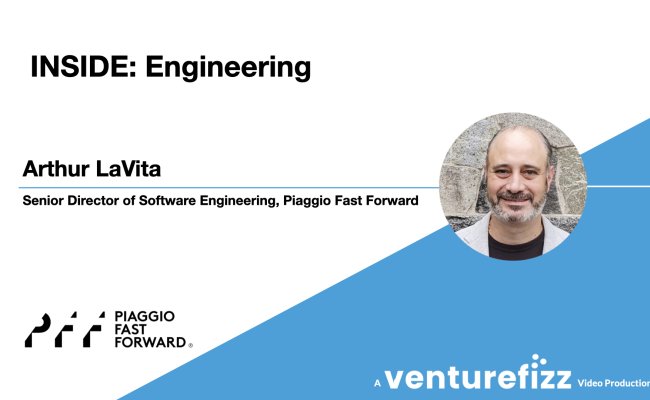Sign up for personalized job alerts, daily insights, & weekly career advice.
In This Video
Interview with Jeffrey Schnapp, Chief Visionary Officer & Co-Founder, shares the details on what it's like to work at Piaggio Fast Forward.
In this video interview, we discuss:
- The details on Piaggio Fast Forward and what they do
- Use cases of their products
- Current stage of the company and growth plans ahead
- Culture at Piaggio Fast Forward
- Why now is the ideal time to join
- And more!
About the
Company
We build technology products that move the way people move.
View Company PageJobs at Piaggio Fast Forward
Related
Transcript
Keith Cline, VentureFizz
Jeffrey, thanks so much for joining us.
Jeffrey Schnapp, PFF
My pleasure.
Keith Cline, VentureFizz
I'm excited to talk to you because we're gonna talk about one of my favorite topics and that is robots. And Piaggio Fast Forward is one of these companies that builds beautifully designed technology products that move the way that people move. So let's unpack that, what is Piaggio Fast Forward?
Jeffrey Schnapp, PFF
So, Piaggio Fast forward is a Boston based robotics company that's part of the Piaggio group based in Milan World Famous for Vesper scooters, among many products that have really defined the like mobility space, were a different kind of like mobility, in as much as we develop robots that, that follow you, whether you're out, you know, working in your professional environment, or out, doing a trip around the block to pick up some groceries and bring it back home. Our products are basically vehicles, small vehicles that that transport, you know, roughly 40 pounds of goods, whatever goods you choose, and they have all the intelligence of an autonomous vehicle, but they use that autonomy in the support of human mobility of getting humans to walk more to make the most sustainable mobility choice that they can make, which is to use their two legs.
Keith Cline, VentureFizz
So how did this all come together? What's the background story of this group?
Jeffrey Schnapp, PFF
So the company was founded seven years ago, I was CEO for the first three years, my colleague, Greg Lin has taken ever since. And our focus from the beginning was to try to innovate in the in New Light mobility spaces. And we looked at a lot of different sectors before we focused on pedestrian robots on these follow-me robots. And what would really become clear to us is that the timeline towards fully autonomous vehicles circulating in human rich complex environments, like sidewalks and public spaces and civic spaces, not to mention lobbies and hallways, that's a long timeline, that's not something that's right around the corner. But if we could leverage the power of human intelligence, the intelligence of human operators to move around those complex spaces, and then add the capabilities of a robot to adapt to the particular shifting situation, the existence of obstacles, other pedestrians moving around pets, you name it, that we could have the best of both worlds. And we could create a product that instead of waiting for us, 20 years out could be operative today. And that's exactly what we've done. For years after the company launched, we were beginning to manufacture our first product, the Gita robot, we've just rolled out a second robot, the Gita Mini, which is a slightly lighter version of the original Gita. And we intend to continue to develop this family of self-balancing follow me vehicles that are Cargo Transporters, and have, again, all of the brainpower and the sensing capabilities of an autonomous vehicle, but that leverage the human skills at interpreting those complex environments that make up the places where we work, the places where we live, the places where we play.
Keith Cline, VentureFizz
This is a beautifully designed product, and obviously incredibly advanced in terms of its capabilities. So what, like it's a consumer product, but there's also multiple use cases beyond just the consumers using it too, right?
Jeffrey Schnapp, PFF
Yeah, we use the consumer market as a testbed in part because it's such a tough market, you really have to have your product fully figured out. And it's got to be extremely intuitive in the way that you operate it. And, but at the same time, even though we have a focus on consumers, we knew that there would be a lot of business applications and indeed, ever since we launched it a few years ago, when we've been developing quite a significant number of pilot projects with everything from grocery stores, grocery cooperatives, who are interested in novel new delivery methods to airports, interested in touch, free touchless delivery of food, to your, to your departure gate, to you know, veterans, hospitals, campuses, resort hotels, really an extremely wide range of applications, places where people move around the world, but they need to move around with stuff. And once you start carrying more than a small amount of stuff, we all know how that can actually have a direct impact on your instinct to reach for the keys to the car. Even if walking is better for you. It's better for the environment. It's better for the society, culture we live in, most of us reach for the keys to the car to travel a quarter mile because we're traveling around the world with heavy stuff that otherwise would be uncomfortable to move around with and where we really see Geeta and our products is stepping into that space, that kind of local motion space and offering people an alternative.
Keith Cline, VentureFizz
What's the current size of this team? And what are the plans in terms of growth ahead for hiring.
Jeffrey Schnapp, PFF
So we're currently at a scale of roughly 65 employees at Piaggio Fast forward. And we are anticipating a growth significant growth even in part because our work is expanding in its compass. Beyond the creation of these robotic vehicles, we're also doing work in developing sensing systems, collision avoidance systems, basically using our technological capabilities on all kinds of vehicles beyond the robots that we ourselves produce. So we're really excited about the opportunities within the company for people to grow, but also at the opportunities for us to expand. And I should mention that we do our manufacturing right here in Boston, right down the street from where we're located. So unlike probably almost any other of the innovation, technology businesses in this area, we are manufacturing is really just down the street from our headquarters, our r&d, our management.
Keith Cline, VentureFizz
That's impressive. Now, as far as the culture of the company, what's it like to work there? What's the day to day environment like?
Jeffrey Schnapp, PFF
Well, it's a really fun place to work. I would say your daily work rhythms are conditioned by the fact that there are people walking up and down the open space office area being followed by robots on the one hand, and by often with dogs, following robots or dogs, following dogs or robots following dogs. You know, it's really a space of experimentation and play just as much as it is a workspace. And we have a lot of fun. And serious fun, it's the kind of fun that kind of blows your mind, sometime we do. We have a machine shop down on the ground floor. So you get actually get to see like the modeling process for forthcoming products. Just an incredibly wide range of testing, research, experimentation, etc. Forms going on at any time. So it's a warm environment. And it's a fun environment where people on all of the different teams interact with one another on a quite regular basis.
Keith Cline, VentureFizz
Now the job market out there is very active, there's lots of opportunities for people to explore. So why is now the ideal time to join Piaggio Fast Forward?
Jeffrey Schnapp, PFF
Well, I guess my first answer would be that we're really on the verge of an explosion of the world of robotics. I mean, robots have been a key feature of the manufacturing and factory floor, you know, for decades at this point. But the kinds of robots that we're going to be seeing that are going to be shaping the world of today and tomorrow, are increasingly robots that are going to be parts of our everyday lives. And you know, up until the present, the only consumer product one can think of that's been highly successful in the robotics fields are vacuum cleaners. Now, vacuum cleaners or robotic vacuum cleaners are kind of cool, I have two of them myself. But the kinds of robots that pff is developing are robots that are really going to be integrated into your everyday life in you know, the really fundamental ways that you intersect with the world that you live in the physical space of your neighborhood. And I think that's just a very exciting horizon to imagine a world where humans and robots are commingling just the way that we deal with our pets, for example, but extending not just to the, you know, our social world, our families, our circles of friends, but also to the ways we work, the way we the ways we move equipment around. So I think it's an exciting moment. It's a moment that promises a great deal in terms of the kind of world we're going to be inhabiting 1015 years from now.
Keith Cline, VentureFizz
Well, it definitely is an opportunity to join a company that is creating the future. And the future is now they have existing products that if you've never seen Gita and how it works, check out their product videos because they are It's a beautifully designed product. And it's exciting to see what the future is going to entail, but it's actually happening now. So check out their job openings on VentureFizz. Go to venturefizz.com/pff, and you'll see all their listings there. Jeffrey, thanks so much for taking the time to walk us through all the great things happening at the company.
Jeffrey Schnapp, PFF
Thanks so much, Keith. It's always fun to chat.
Transcribed by https://otter.ai





